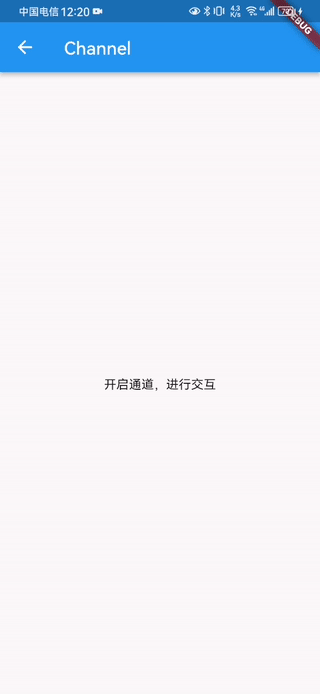场景
在使用 Flutter 进行功能模块或者整体项目的开发时,如果需要(阶段性)频繁地和某个第三方 Native-SDK 进行交互,而该 Native-SDK 没有实现 Flutter 插件版本的情况下,如果直接把这部分交互 API 加入到原有的 channel 类里面,会使得该 channel 类变得臃肿,造成代码维护及迭代上的难度;而且,对于一些平常比较少用到的功能,也不需要一上来就初始化 channel-api,占用空间,而是在使用时才初始化,使用后也可以手动清除;
在此提出一种“Flutter 与第三方 Native-SDK 的交互代理方案”,通过一种“代理包装”的方式,尝试较好地解决以上提到的问题;
效果
该方案使用的是 Flutter+Android 进行 demo,全屏 loading、底部灰底 toast 为 Android 端实现,方块 loading、中间黑底 toast 为 Flutter 端实现

范例
需要使用时才开启 channel,使用结束后关闭 channel 监听
class _TestPageState extends State<TestPage> {
@override
void initState() {
super.initState();
}
@override
Widget build(BuildContext context) {
return Scaffold(
appBar: AppBar(title: const Text('Channel')),
body: Center(
child: Column(
mainAxisAlignment: MainAxisAlignment.center,
children: <Widget>[
GestureDetector(
onTap: () => channelTest(),
child: const Text('开启通道,进行交互'),
),
],
),
),
);
}
Future<void> channelTest() async {
TestChannelProxy? channel = await TestChannelProxy.openChannel();
if (channel != null) {
Function()? cancel;
channel.doSomethingAndListener(DoSomethingCallback(
onTestFirst: (result) {
cancel = MsgUtil.loading(msg: result);
},
onTestSecond: () {
cancel?.call();
},
onTestThird: (result) async {
MsgUtil.toast(result.toString());
return !result;
},
));
}
}
}代码(Flutter 端代理类)
维护与 Native 端的交互,使用者不需要知道具体交互逻辑,但是在该代理类中,需要保证每次有回调的交互都能正确回调(不管是状态为成功的回调,还是状态为失败的回调)
import 'package:flutter/services.dart';
import 'platform_method_channel.dart';
const String _testChannelName = 'zzq.channel.TestChannelProxy';
class TestChannelProxy {
late MethodChannel _channel;
DoSomethingCallback? _callback;
TestChannelProxy._() {
_channel = const MethodChannel(_testChannelName);
_channel.setMethodCallHandler(_handleMethod);
}
/// [return] 为空表示开启失败,不为空表示开启成功
static Future<TestChannelProxy?> openChannel() async {
bool success = await PlatformMethodChannel.getInstance()
.openPlatformChannel(_testChannelName);
return success ? TestChannelProxy._() : null;
}
/*Future<void> closeChannel() async {
await _channel.invokeMethod('closeChannel');
_channel.setMethodCallHandler(null);
}*/
// ------------------------------ flutter 调用 native ------------------------------
void doSomethingAndListener(DoSomethingCallback callback) {
_callback = callback;
_channel.invokeMethod('doSomethingAndListener');
}
// ------------------------------ native 调用 flutter ------------------------------
Future _handleMethod(MethodCall call) async {
var args = call.arguments;
switch (call.method) {
case 'getString':
return _getString();
case 'getBoolean':
return _getBoolean();
case 'onTestFirst':
_onTestFirst(args);
break;
case 'onTestSecond':
_onTestSecond();
break;
case 'onTestThird':
return _onTestThird(args);
default:
break;
}
}
Future<String> _getString() async {
await Future.delayed(const Duration(seconds: 2));
return 'String';
}
Future<bool> _getBoolean() async {
await Future.delayed(const Duration(seconds: 2));
return true;
}
void _onTestFirst(String result) {
_callback?.onTestFirst?.call(result);
}
void _onTestSecond() {
_callback?.onTestSecond?.call();
}
Future<bool> _onTestThird(bool result) async {
return (await _callback?.onTestThird?.call(result)) ?? false;
}
}
class DoSomethingCallback {
final Function(String result)? onTestFirst;
final Function()? onTestSecond;
final Future<bool> Function(bool result)? onTestThird;
DoSomethingCallback({
this.onTestFirst,
this.onTestSecond,
this.onTestThird,
});
}需要在默认/全局的 channel 中定义通用的开启 channel 的 api,提供代理交互 channel 的开启能力
/// 开启 flutter 与 native 端的交互通道,用于使用第三方 native-sdk 的能力
/// 可以是 BasicMessageChannel、MethodChannel、EventChannel
/// [return] 通道是否开启成功
Future<bool> openPlatformChannel(String channelName) async {
var result = await _channel.invokeMethod('openPlatformChannel', channelName);
return result == true;
}override fun onMethodCall(call: MethodCall, result: MethodChannel.Result) {
val args = call.arguments
when (call.method) {
"openPlatformChannel" -> openPlatformChannel(args as String, result)
else -> result.notImplemented()
}
}
/**
* 开启 flutter 与 native 端的交互通道,用于 flutter 端使用第三方 native-sdk 的能力
* 可以是 BasicMessageChannel、MethodChannel、EventChannel
* [result.success] 通道是否开启成功
*/
private fun openPlatformChannel(channelName: String, result: MethodChannel.Result) {
var success = true
when (channelName) {
TEST_CHANNEL_NAME -> TestTool.openChannel(binaryMessenger)
else -> success = false
}
result.success(success)
}代码(Android 端第三方 Native-SDK 包装类)
该类用于包装第三方 Native-SDK 所提供的能力,同时持有、维护 Flutter-Android-channel 中在 Android 端的代理 channel 实例;即该类负责 SDK 能力使用及拓展,而 channel 代理类只负责通讯(发起及监听等)
import io.flutter.plugin.common.BinaryMessenger
import kotlinx.coroutines.CoroutineScope
import kotlinx.coroutines.Dispatchers
import kotlinx.coroutines.delay
import kotlinx.coroutines.launch
object TestTool {
private var testChannelProxy: TestChannelProxy? = null
fun openChannel(messenger: BinaryMessenger) {
if (testChannelProxy == null) {
synchronized(TestTool::class.java) {
if (testChannelProxy == null) {
testChannelProxy = TestChannelProxy(messenger)
}
}
}
}
/*fun closeChannel() {
testChannelProxy = null
}*/
fun doSomethingAndListener() {
DialogManager.showLoading()
testChannelProxy?.getBoolean { it ->
DialogManager.hideLoading()
if (it) {
CoroutineScope(Dispatchers.Main).launch {
delay(2000)
testChannelProxy?.onTestFirst("点了")
delay(2000)
testChannelProxy?.onTestSecond()
delay(2000)
testChannelProxy?.onTestThird(true) {
DialogManager.toast(it.toString())
}
}
}
}
}
}代码(Android 端代理类)
维护与 Flutter 端的交互,使用者不需要知道具体交互逻辑,但是在该代理类中,需要保证每次有回调的交互都能正确回调(不管是状态为成功的回调,还是状态为失败的回调)
import android.os.Handler
import android.os.Looper
import io.flutter.plugin.common.BinaryMessenger
import io.flutter.plugin.common.MethodCall
import io.flutter.plugin.common.MethodChannel
const val TEST_CHANNEL_NAME = "zzq.channel.TestChannelProxy"
class TestChannelProxy(messenger: BinaryMessenger) : MethodChannel.MethodCallHandler {
private val channel: MethodChannel
init {
channel = MethodChannel(messenger, TEST_CHANNEL_NAME)
channel.setMethodCallHandler(this)
}
// ------------------------------ flutter 调用 native ------------------------------
override fun onMethodCall(call: MethodCall, result: MethodChannel.Result) {
val args = call.arguments
when (call.method) {
"doSomethingAndListener" -> TestTool.doSomethingAndListener()
else -> result.notImplemented()
}
}
/*fun closeChannel() {
channel.setMethodCallHandler(null)
TestTool.closeChannel()
}*/
// ------------------------------ native 调用 flutter ------------------------------
/**
* Methods marked with @UiThread must be executed on the main thread. Current thread: AsyncTask
*/
private fun mainInvokeMethod(method: String, arguments: Any?, callback: MethodChannel.Result?) {
if (Looper.myLooper() == Looper.getMainLooper()) {
channel.invokeMethod(method, arguments, callback)
} else {
Handler(Looper.getMainLooper()).post {
channel.invokeMethod(method, arguments, callback)
}
}
}
fun getString(callback: (string: String?) -> Unit) {
mainInvokeMethod(
"getString",
null,
object : MethodChannel.Result {
override fun success(result: Any?) {
callback(if (result is String) result else null)
}
override fun error(code: String, msg: String?, details: Any?) {
callback(null)
}
override fun notImplemented() {
callback(null)
}
})
}
fun getBoolean(callback: (boolean: Boolean) -> Unit) {
mainInvokeMethod(
"getBoolean",
null,
object : MethodChannel.Result {
override fun success(result: Any?) {
callback(result == true)
}
override fun error(code: String, msg: String?, details: Any?) {
callback(false)
}
override fun notImplemented() {
callback(false)
}
})
}
fun onTestFirst(result: String) {
mainInvokeMethod("onTestFirst", result, null)
}
fun onTestSecond() {
mainInvokeMethod("onTestSecond", null, null)
}
fun onTestThird(result: Boolean, callback: (success: Boolean) -> Unit) {
mainInvokeMethod(
"onTestThird",
result,
object : MethodChannel.Result {
override fun success(result: Any?) {
callback(result == true)
}
override fun error(code: String, msg: String?, details: Any?) {
callback(false)
}
override fun notImplemented() {
callback(false)
}
})
}
}





















